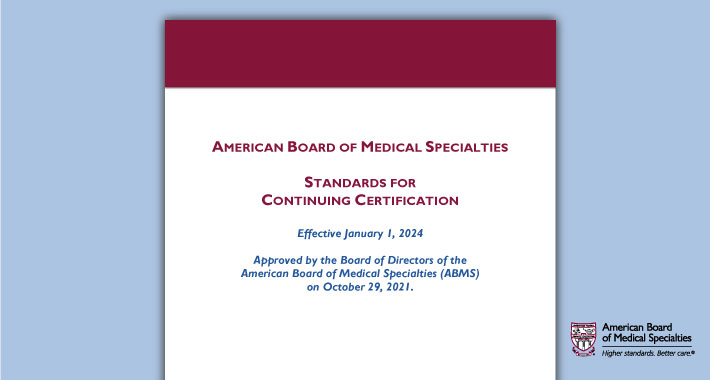
Newly Approved Standards for Continuing Certification Serve as a Framework for Member Boards’ Programs, Represent Foundational Changes that Bring Increased Value to both Diplomates and the Public
CHICAGO – November 1, 2021 – The American Board of Medical Specialties (ABMS) Board of Directors (BOD) has approved new Standards for Continuing Certification (Standards) at its October meeting. The new Standards represent the culmination of three years of consultation with physicians, professional and state medical societies, consumers, and other public stakeholders from across the health care spectrum to reconceive the way specialty physician recertification is conducted. The Standards were developed following recommendations from the Continuing Board Certification: Vision for the Future Commission (Commission) which met throughout 2018 to provide strategic guidance to the ABMS BOD and Member Boards. The new Standards have been designed to guide the ABMS Member Boards in establishing continuing certification programs that help diplomates stay current in their specialty while providing hospitals, health systems, patients, and communities with a credential upon which they can continue to rely and depend.
“The approval of these Standards is a pivotal moment for ABMS, its Member Boards, and the greater health care community,” said ABMS BOD Chair Larry A. Green, MD. “These Standards reinforce the core value of board certification for all stakeholders, most notably diplomates and their patients. Board certification tells a story about an individual’s knowledge, judgment, and skills and represents their commitment to professionalism and improving the systems in which they work. Participating in an ABMS Member Board’s continuing certification program encourages continuous learning and improvement while simultaneously assuring patients that diplomates are up-to-date in their specialty or subspecialty.”
The development of the new Standards was inclusive and transparent by design. Nearly 100 volunteers were involved in the process, representing important stakeholder groups, including professional and state medical societies, individual practicing diplomates, Member Boards, and public constituents including credentialers and health care advocates. Additionally, thousands of individuals and organizations provided feedback on the draft Standards during an 80-day public comment period earlier this year. The feedback collected was highly valued and each draft Standard was revised in some manner to address the comments received. This resulted in a final set of Standards that meets the needs of the stakeholders who possess, use, or rely upon the board certification credential as an indicator of a diplomate’s skills, knowledge, judgment, and professionalism.
“The final Standards recognize the value that continuing certification brings to diplomates and the public, allowing ABMS to deliver on its mission in two foundational ways,” explained ABMS President and Chief Executive Officer Richard E. Hawkins, MD. “First, they support both the learning and improvement needs and desires of diplomates while providing the public with a reliable and dependable credential. Secondly, the Standards acknowledge that professional self-regulation is a collaborative process that requires the involvement of our partners including our professional societies, Associate Members, and hospitals and health systems. Each of these stakeholders has an important role in supporting their members’ engagement in meaningful learning and improvement work.”
The new Standards reinforce the transition to innovative assessment programs that support and direct learning. These new assessment models represent an intentional shift from conventional high stakes exams every 10 years to frequent, flexible, online testing that offers immediate feedback and directs participants to resources for further study. The new systems support learning and retention and complement the continuing education that that all physicians undertake to improve their skills. The new Standards also support greater opportunities for recognition of quality and safety improvement activities in which diplomates are engaged.
Commission Co-Chairs Christopher Colenda, MD, MPH and William Scanlon, PhD noted “The Commission’s recommendations sought to reinforce the role of continuing certification as a collaborative effort between ABMS diplomates and their specialty certification boards to ensure that continuing certification programs provide value to diplomates, patients, and to health systems and regulatory bodies. Further, the Commission recommended that continuing certification programs support diplomates in lifelong professional development to keep them current in their specialties in service of patient care. We believe the new Standards have achieved these goals, including the need for greater health equity and reduced health care disparities, a broader, more collaborative approach to continuing professional education, and shortened certification cycle times to better meet patient and public expectations.”
The new Standards provide the Member Boards the flexibility to address specialty-specific requirements, and many boards have already incorporated programmatic changes that are aligned with the new Standards. A phased-in transition will be used to implement the standards and Member Boards will continue to assess, update, and modify their programs based on diplomate and public feedback.
“This was an ABMS community-wide endeavor,” Dr. Hawkins concluded. “We are most grateful to everyone who dedicated their time to help write or offered feedback that informed these new Standards which will serve and lead the next generation of continuing board certification and achieves the ABMS and Member Board promise of Higher Standards. Better Care.”
About ABMS
Established in 1933, the American Board of Medical Specialties (ABMS) is the leading not-for profit organization overseeing physician certification in the United States. ABMS supports 24 Member Boards that develop educational and professional standards and programs of assessment to certify physician specialists, all dedicated to improving the quality of care to the patients, families, and communities they serve. More than 920,000 physicians are certified in one or more of 40 specialties and 87 subspecialties offered by the ABMS Member Boards. For more information about ABMS, visit abms.org or call (312) 436-2600.
